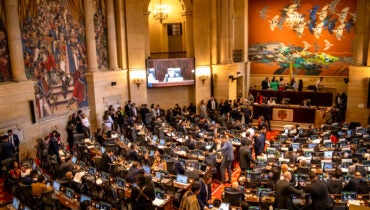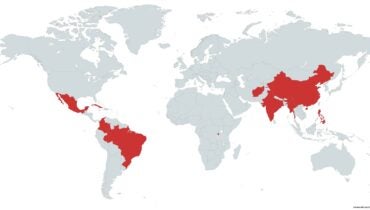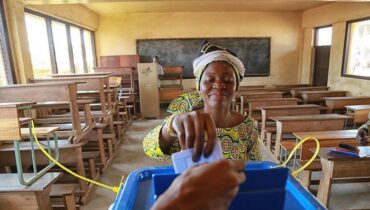In 2011, the Arab Spring precipitated fervent calls for democratic reforms, leading the Moroccan government to enact gender quotas that reserved seats for women in Parliament as well as regional, district, and communal councils. As a result of these new electoral laws, Moroccan voters elected an unprecedented number of women to legislatures at all levels of government, from local councils to the House of Representatives.
Gender quotas have successfully increased the descriptive, or numerical, inclusion of women in Moroccan government. It is not immediately clear, however, how these gains in women’s descriptive representation have affected women’s substantive representation—the representation of their policy preferences and priorities.
This article examines whether extensive gender quota provisions in Morocco have meaningfully contributed to women’s political inclusion.
What are Gender Quotas?
Gender quotas are an affirmative action measure designed to address the underrepresentation of women in politics. They were originally adopted by political parties in Norway during the 1970s, and they have since become one of the fastest-growing legal trends spreading to different regions of the world and different political contexts. Today, 132 countries have implemented some kind of quota for women.
There is considerable variation across quota systems, although practitioners and scholars have broadly sorted quotas into a few main categories. Reserved seats set aside a proportion of spots in a legislature for women, thereby guaranteeing that a certain number of women will be elected. Conversely, candidate quotas push political parties to ensure that a particular share of their candidates are women. Candidate quotas can be mandatory—imposed by the constitution or through electoral laws—or they may be adopted voluntarily by political parties.
“The rapid expansion of gender quotas gave rise to an unprecedented demand for women candidates among political parties.”
The Evolution of Gender Quotas in Morocco
Morocco presents a particularly interesting case study because both voluntary political party quotas and reserved seats have been employed to bolster women’s political inclusion.
Before the implementation of gender quotas, very few women held public office, and women were rarely seen as leaders in the public sphere. Moroccan activists began advocating for gender quotas in the 1990s, partially in response to Morocco’s ratification of the Convention on the Elimination of All Forms of Discrimination against Women (CEDAW) in 1993. CEDAW compels ratifying states to “take all appropriate measures, including legislation and temporary special measures” to advance women’s human rights. Moroccan activists used this mandate as leverage to lobby for gender quotas, which spurred some political parties to adopt quotas for women in their own national political bodies in the late 1990s.
Women’s rights activists continued to advocate for a more extensive quota system, but many were worried that the Supreme Court would find legislated quotas unconstitutional. To circumvent this risk, the 2002 national elections were designed such that 30 seats in the 325-seat House of Representatives were elected through a national list; political parties voluntarily made an “honorary agreement” to reserve these 30 seats for women. Quotas emerged at the local level in 2009, when the Communal Charter provided a 12% quota through additional election constituencies reserved exclusively for women.
In 2011, the Arab Spring ushered in a new phase of gender quotas in Morocco. The government implemented a variety of democratic reforms to appease protestors, including laws that institutionalized and expanded gender quotas at all levels of government. The national list of seats reserved for women doubled from 30 to 60 seats, ensuring women would comprise at least 15% of the House of Representatives. An additional 30 seats were reserved for people under 40. Although political parties originally ran just men in this national constituency for youth, it later opened up to include women. At the sub-national level, the House of Representatives amended laws relating to local governance that increased the proportion of women representatives from 12% to 27% in communal councils.
“Many interviewees believe that politics has become more dynamic, inspired, and committed with the inclusion of women.”
Gender Quotas Make Political Careers Accessible to Women
The rapid expansion of gender quotas gave rise to an unprecedented demand for women candidates among political parties. Given the historical absence of women from politics, however, political parties had to proactively recruit and invest in women in order to fill their candidate lists.
The women who were best positioned to take advantage of this opportunity were those who came from families with well-established political legacies, as well as educated women who sought to use their expertise to help shape Morocco’s future. My interviews with women who comprise this new cohort of political leaders suggest that both factors—upbringing and education—were influential in their journeys to becoming elected officials.
One Member of Parliament shared that she joined politics because she came from a politically active family, but it was her work as a children’s psychologist that has informed her goal to advance legislation and programming for at-risk youth.
Similarly, a councilwoman stated that she was inspired to engage in public life by her parents’ fight against Spanish colonization. She was educated on human rights and raised in an environment of nationalism and patriotism. This upbringing cultivated her interest in politics, and her job as a high school teacher made her passionate about education reform and advocacy. As a council member, she has led initiatives to renovate schools and promote interactive pedagogy; at a “festival of schools” that she organized, 250 children participated in a play about environmental protection.
Another Member of Parliament was raised by journalists and always considered herself to be civically engaged, although her interest in politics was sparked later on by the Arab Spring. She has leveraged her experience in engineering and internet technology to introduce innovative proposals on topics like cryptocurrency.
Considering many women representatives brought their expertise and passions to their newfound roles as representatives, it is unsurprising that many interviewees believe that politics has become more dynamic, inspired, and committed with the inclusion of women.
Activists Look Beyond Quotas to Achieve Full Inclusion for Women
While the gender quota system has led to a commendable increase in the number of women politicians in Morocco, the evidence suggests that quotas alone are insufficient to secure political influence for Moroccan women more widely. Interviews with activists, councilwomen, and Members of Parliament indicate that more can be done to ensure that the needs of women across social groups are addressed by their representatives.
On the one hand, politicians at both the local and national level stated that quotas have led to meaningful change. By ensuring that women comprise a considerable minority in legislatures, gender quotas have helped normalize women’s political participation. In fact, interviewees echoed focus group findings that women representatives are often considered more hardworking and trustworthy than men.
In addition, several interviewees also believed that the mere presence of women representatives has made the political system more accessible and responsive to women constituents. One councilwoman stated that the quotas helped women feel more comfortable interacting with the town council, even just for simple administrative tasks like paperwork. Another councilwoman asserted that gender quotas have facilitated more gender-sensitive initiatives; for example, councilwomen changed the timing of a council event to occur before dinner, making it more accessible to many women in town who do not leave their homes after dark.
On the other hand, these electoral successes have been accompanied by several challenges. Many interviewees expressed that, once elected, it is difficult for women to attain positions of power within government. Very few women are in leadership positions in parliamentary groups or commissions, and at the local level, only 15 communal presidents and three provincial/prefectural council presidents are women.
“More work must be done to ensure that the diversity of women’s needs and the perspectives of women from marginalized communities are truly included.”
Members of Parliament also expressed that women are frequently assigned to committees with relatively little power, such as committees on gender parity, social affairs, and family rights. While these topics are undeniably important, they are often viewed as “women’s issues” and are afforded less legitimacy and fewer resources, thereby diminishing the impact of women who sit on these committees. Several interviewees stated that they advocated for themselves to be assigned to more powerful committees, such as those on finance and foreign affairs, in defiance of the expectation they participate in one of the “women’s committees.”
Not only do women face obstacles that dilute their influence in office, but the design of Morocco’s quota system also inhibits women from remaining in the House of Representatives. Women are only allowed to hold a seat from the reserved national list once, so if they want to continue as parliamentary representatives, they must compete for seats in the district constituencies. Many interviewees noted that men are typically already established in these constituencies, and political parties rarely give women enough support to effectively compete for their seats. Among the 67 women deputies in the 2011-2016 House of Representatives, 91% did not return. Thus, some interviewees lamented that the current gender quota functions as a kind of glass ceiling for many women representatives that leads to a loss of institutional knowledge and momentum.
Another interviewee critiqued the gender quota for reinforcing a reductive gender binary. By championing women and “women’s interests,” gender quotas can obscure the fact that there are people who do not fit neatly within the cisgender man-woman dichotomy. Trans and genderqueer people may therefore feel that quotas for women are irrelevant to them and the unique challenges they experience as a result of their gender identity.
Implications for the Future of Gender Quotas in Morocco and Beyond
While the quota system in Morocco has facilitated critical developments for women’s political inclusion, interviewees unanimously acknowledged that the road to parity is long. Though gender quotas have created a new demand among political parties for women candidates, the women who were best positioned to fill this gap were those who came from families with political legacies. More work must be done to ensure that the diversity of women’s needs and the perspectives of women from marginalized communities are truly included. This case study, however, shows that gender quotas can be an important tool to nurture inclusive governance and realize equity, helping to create a world where gender quotas are eventually obsolete.
Delana Sobhani (SFS ’18) is a J.D. candidate at Harvard Law School. She conducted this research during her 2020-2021 Fulbright fellowship in Morocco.


